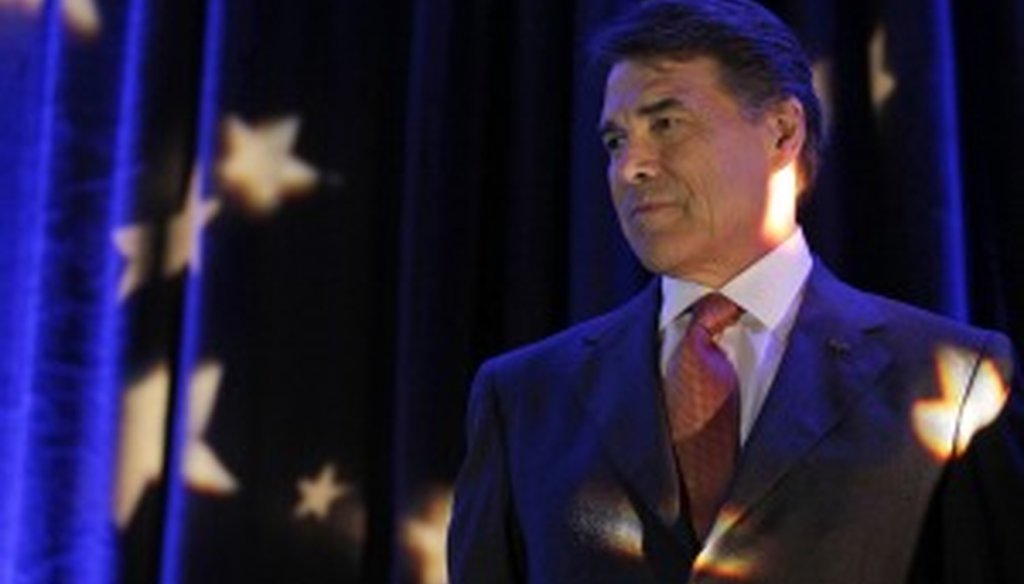Get PolitiFact in your inbox.

Gov. Rick Perry was in San Diego last week and spoke at a Boy Scouts event aboard the USS Midway Museum.
As Gov. Rick Perry unsuccessfully sought legislation to ensure that law enforcement officers can ask about the citizenship status of someone they've detained, he fulfilled campaign promises related to border security and human trafficking.
On the PolitiFact Texas Perry-O-Meter, we’ve marked these two promises as Kept: the governor's 2010 vows to toughen the laws against human traffickers and to increase state funding of security efforts along the border.
During his re-election campaign, Perry urged the Legislature to crack down on human trafficking with criminal penalties ranging from 25 years to life. "Human traffickers prey on the hopes and dreams of their victims, promising better lives, when unfortunately what awaits is a life of confinement, criminal activity and physical and mental abuse," Perry said during remarks in Houston, according to an Aug. 19 press release. "I'm here today to call upon the Texas Legislature to further toughen the laws against these traffickers."
In March, Perry appeared in Houston with Sen. Leticia Van de Putte of San Antonio and Rep. Senfronia Thompson of Houston, Democrats who had filed legislation to impose stricter penalties on traffickers who force their victims into work or prostitution.
"We're here today to discuss the horrors of human trafficking which, when you've seen the horrific details about these crimes, is really nothing more than a modern-day slave trade," Perry said. "Traffickers feed off the hopes and dreams of those who long for different lives, whether leaving their home country to come to America or perhaps running away from homes already here in the United States."
The following month, Perry signed into law a bill by Van de Putte that enacts recommendations from a task force on human-trafficking prevention that was created in 2009. Among other changes, the legislation increases to a first-degree felony the offense of compelling a child into prostitution and requires that repeat offenders receive a life sentence.
Perry also signed a bill by Thompson that creates a new first-degree felony — "continuous trafficking of persons" — to apply to repeat offenders. The punishment can range from 25 years to life in prison.
Perry made his border security pledge in an April 2010 press release in which he also criticized the federal government's efforts to keep the U.S.-Mexico border area safe.
"Until the federal government brings the necessary resources to bear," Perry said, "we will continue to commit state funding and resources for additional border security efforts in order to protect our communities and legitimate cross border trade and travel, while enforcing the laws already on the books."
During this year's legislative session, key areas of the budget such as public and higher education saw their funding for the next two-year cycle cut, but border security was an exception.
We gathered budget information from the Legislative Budget Board, which advises lawmakers on budgetary matters, as well as the agencies in state government responsible for border security: the governor’s office, the Department of Public Safety and the Parks and Wildlife Department. Because of the way that different agencies categorize border security spending, the total increase from the current biennium to the next varies, from $40 million to $100 million. But the fact is that state spending on border security efforts is going up in the 2012-13 budget cycle.
DPS spokesman Tom Vinger told us that the department's border security funding — which pays for, among other costs, operations and overtime for state and local law enforcement officers, surveillance aircraft and technology to expand intelligence centers — will increase by about $70 million in the next biennium.
Tom Harvey, a spokesman for Parks and Wildlife, said the agency’s two-year border security funding of $3.8 million — which pays for 15 game warden positions, who are commissioned peace officers — wasn't increased in the 2012-13 budget. However, he said, a budget-related bill that is currently on the governor's desk spends about $910,000 for two boats, one to patrol the Rio Grande and another Falcon Lake, a reservoir on the river that has been the site of drug cartel smuggling and violence.
As we continue to take stock of what lawmakers did — and didn’t do — during the recently ended regular and special legislative sessions, we’ll keep on updating the Perry-O-Meter. See something we've missed? Let us know at [email protected].
Our Sources
See related promises



















































